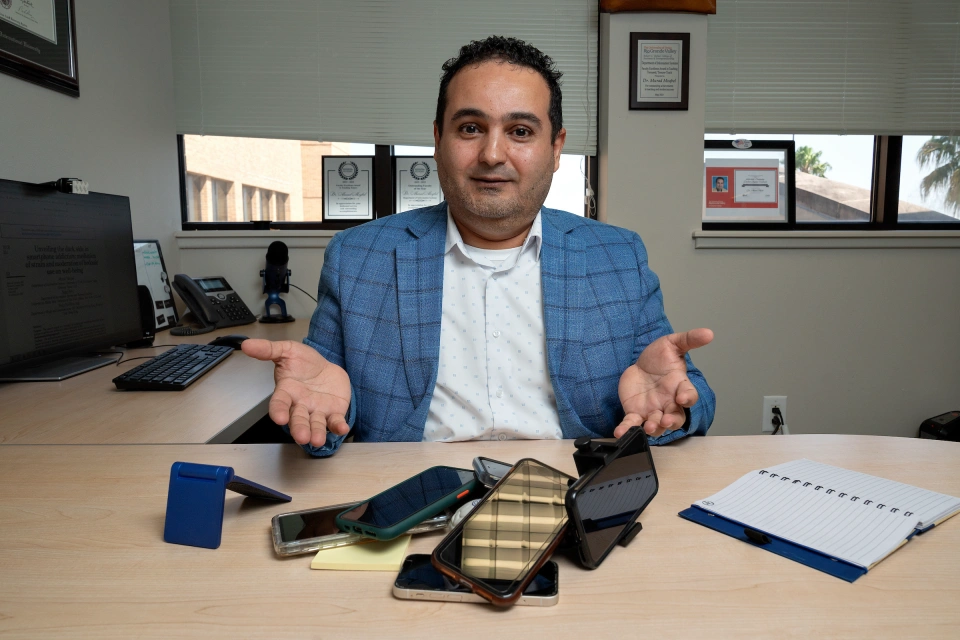By Karen Villarreal
RIO GRANDE VALLEY, TEXAS – Smartphones have evolved into all-in-one devices, replacing calendars, navigation systems, music players and entertainment consoles.
But UTRGV’s Dr. Murad Moqbel warns there can be harmful effects as excessive smartphone use becomes normalized.
“The first thing many people do when they wake up is get on their phone, and they’re on it until the last moment that they go to bed,” said Moqbel, associate professor in the UTRGV Department of Information Systems, part of the Robert C. Vackar College of Business and Entrepreneurship. “Excessive, or hedonic, use evolves to addictive use.”
Moqbel has published research papers in 2020, 2022 and 2023 on the impact of smartphone overuse on health, wellbeing and performance at work and school. His research also aims to identify intervening mechanisms to reduce those negative impacts.
“Our goal as researchers is to solve problems, and excessive smartphone use is now a common problem that touches everyone,” he said.
INSIDIOUS ADDICTIONS
Moqbel says that while excessive smartphone use is not formally recognized as an addiction, it shares many similarities with excessive video-game use. And addiction to gaming is described in the American Psychiatric Association's Diagnostic and Statistical Manual of Mental Disorders (DSM-5-TR), and recognized by the World Health Organization as gaming disorder.
Moqbel said these behavioral addictions share many symptoms with substance addictions.
“Users develop tolerance. The more they use it, they want it more and more,” he said. “There’s withdrawal; they get anxious without it.”
Most people in his studies had specific apps that triggered excessive use: They spent 80 percent of their screen time with 20 percent of their apps.
Such excessive-use behaviors deplete mental energy, a reserve that is important for creativity and innovative thinking.
“It replaces attention and focus,” he said.
SOCIAL RESPONSIBILITY
While it ultimately is on users to regulate their use, app providers intentionally develop their products to profit from their addictive nature.
“I’m sure these companies could be socially responsible and balance that profitability with people’s wellbeing,” he said.
He speculates that future technology may feature excessive-use warnings, or ads that encourage breaks from the screens.
UTRGV student Oliver Gonzalez, 22, said he already sees those kinds of ads sporadically on TikTok.
“But in the comments, it’s just people dunking on TikTok for even suggesting such a thing,” he said.
Gonzalez, a senior in the computer science program, thinks limits on screen time is a good idea – especially for younger students who don’t even know a world without smartphones.
“Kids are getting the short end because it’s the responsibility of parents to regulate that,” he said, “But when the parent is on their phone all day, too, the kids think that’s normal. How can they resist?”
FORGING NEW HABITS
Moqbel’s studies found that a lot of people admit their use is excessive.
“They need help and want suggestions,” he said.
Employers can take steps to increase energy wellbeing resources at work by encouraging social and mindfulness substitutes to their employees. He recommends beneficial activities – like meditation practices, book clubs and athletic groups – as an additional motivating factor to replace idle scrolling.
“People feel they can’t live without it, but it is doable,” he said.
If you are concerned about a technology addiction or other behavior, make an appointment with the UTRGV Counseling Center at counseling@utrgv.edu. On the Edinburg Campus, call 956-665-2574; in Brownsville, call 956-882-3897).
ABOUT UTRGV
The University of Texas Rio Grande Valley (UTRGV) was created by the Texas Legislature in 2013 as the first major public university of the 21st century in Texas. This transformative initiative provided the opportunity to expand educational opportunities in the Rio Grande Valley, including a new School of Medicine and a School of Podiatry, and made it possible for residents of the region to benefit from the Permanent University Fund – a public endowment contributing support to the University of Texas System and other institutions.
UTRGV has campuses and off-campus research and teaching sites throughout the Rio Grande Valley including Brownsville (formerly The University of Texas at Brownsville campus), Edinburg (formerly The University of Texas-Pan American campus), Harlingen, Weslaco, McAllen, Port Isabel, Rio Grande City and South Padre Island. UTRGV, a comprehensive academic institution, enrolled its first class in the fall of 2015; the School of Medicine welcomed its first class in the summer of 2016, and the School of Podiatric Medicine in the fall of 2022.

